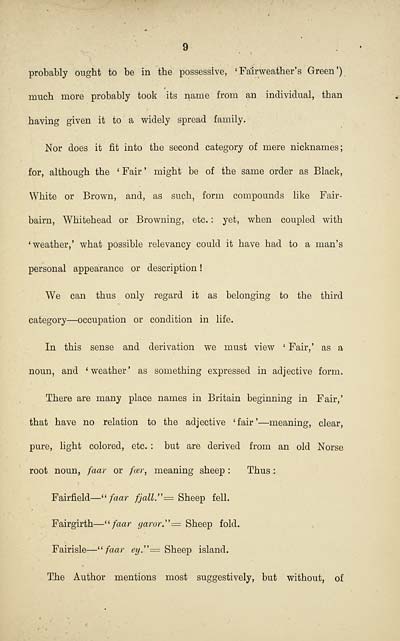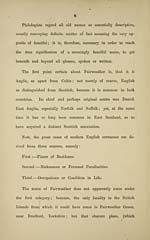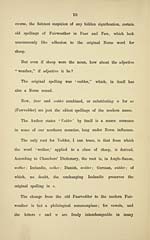Memorandum regarding the Fairweathers of Menmuir Parish, Forfarshire, and others of the surname
(13) Page 9
Download files
Complete book:
Individual page:
Thumbnail gallery: Grid view | List view

9
probably ought to be in the possessive, ' Fa'irweather's Green')
much more probably took its name from an individual, than
having given it to a widely spread family.
Nor does it fit into the second category of mere nicknames;
for, although the ' Fair ' might be of the same order as Black,
White or Brown, and, as such, form compounds like Fair-
bairn, Whitehead or Browning, etc. : yet, when coupled with
'weather,' what possible relevancy could it have had to a man's
personal appearance or description !
We can thus only regard it as belonging to the third
category — occupation or condition in life.
In this sense and derivation we must view ' Fair,' as a
noun, and 'weather' as something expressed in adjective form.
There are many place names in Britain beginning in Fair,'
that have no relation to the adjective 'fair' — meaning, clear,
pure, light colored, etc. : but are derived from an old Norse
root noun, faar or far, meaning sheep : Thus :
Fairfield — "faar fjall."= Sheep fell.
Fairgirth — "faar garor.' , = Sheep fold.
Fairisle — "faar ey."= Sheep island.
The Author mentions most suggestively, but without, of
probably ought to be in the possessive, ' Fa'irweather's Green')
much more probably took its name from an individual, than
having given it to a widely spread family.
Nor does it fit into the second category of mere nicknames;
for, although the ' Fair ' might be of the same order as Black,
White or Brown, and, as such, form compounds like Fair-
bairn, Whitehead or Browning, etc. : yet, when coupled with
'weather,' what possible relevancy could it have had to a man's
personal appearance or description !
We can thus only regard it as belonging to the third
category — occupation or condition in life.
In this sense and derivation we must view ' Fair,' as a
noun, and 'weather' as something expressed in adjective form.
There are many place names in Britain beginning in Fair,'
that have no relation to the adjective 'fair' — meaning, clear,
pure, light colored, etc. : but are derived from an old Norse
root noun, faar or far, meaning sheep : Thus :
Fairfield — "faar fjall."= Sheep fell.
Fairgirth — "faar garor.' , = Sheep fold.
Fairisle — "faar ey."= Sheep island.
The Author mentions most suggestively, but without, of
Set display mode to:
![]() Universal Viewer |
Universal Viewer | ![]() Mirador |
Large image | Transcription
Mirador |
Large image | Transcription
Images and transcriptions on this page, including medium image downloads, may be used under the Creative Commons Attribution 4.0 International Licence unless otherwise stated. ![]()
| Histories of Scottish families > Memorandum regarding the Fairweathers of Menmuir Parish, Forfarshire, and others of the surname > (13) Page 9 |
|---|
| Permanent URL | https://digital.nls.uk/94897354 |
|---|
| Description | A selection of almost 400 printed items relating to the history of Scottish families, mostly dating from the 19th and early 20th centuries. Includes memoirs, genealogies and clan histories, with a few produced by emigrant families. The earliest family history goes back to AD 916. |
|---|

